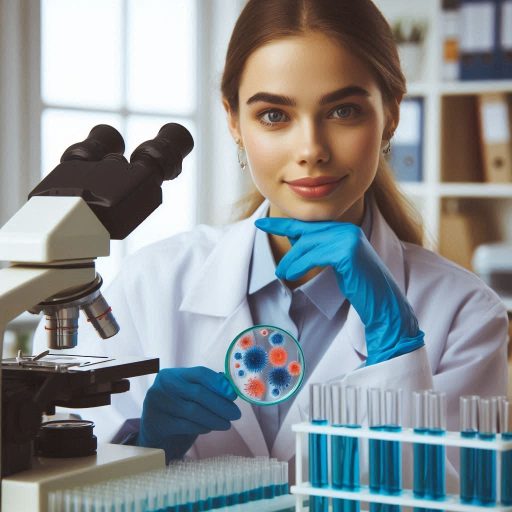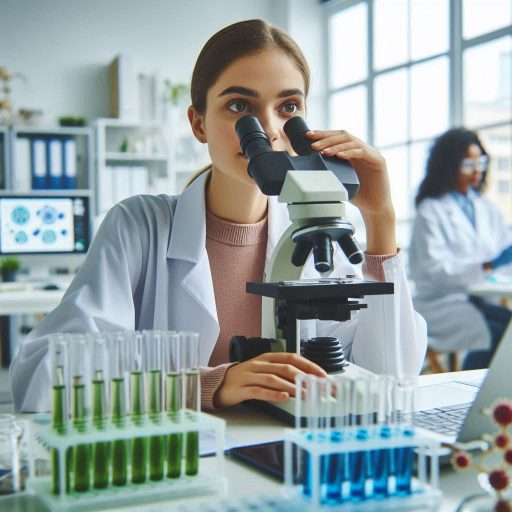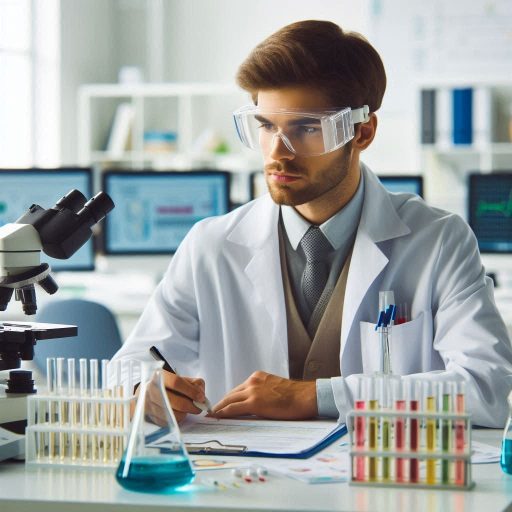Introduction
Microbiology research explores the fascinating world of microorganisms, including bacteria, viruses, fungi, and protozoa.
These microscopic entities play essential roles in various biological processes and ecosystems.
By studying their genetics, ecology, and physiology, researchers can uncover how these organisms function and interact within their environments.
This research forms the foundation for significant advancements in several fields, including medicine, agriculture, and environmental science.
The importance of microbiology research in medicine cannot be overstated.
It has led to the development of antibiotics and vaccines that save millions of lives each year.
Understanding microbial pathogenesis helps scientists identify how pathogens cause disease and how to combat them effectively.
Furthermore, microbiology research plays a crucial role in improving public health by studying the transmission of infectious diseases and identifying potential outbreaks.
In agriculture, microbiology research enhances crop resilience and promotes sustainable practices.
Microbial inoculants improve soil health and nutrient availability, boosting crop yields while reducing chemical fertilizers’ environmental impact.
This research also aids in developing biopesticides, which can control agricultural pests with minimal harm to beneficial organisms.
The food industry greatly benefits from microbiology research as well.
It ensures food safety and quality by employing microbial analysis to detect pathogens and spoilage organisms.
Key Areas of Microbiology Research
Study of microorganisms such as bacteria, viruses, fungi, and parasites
The study of microorganisms, including bacteria, viruses, fungi, and parasites, forms a fundamental aspect of microbiology research.
These tiny organisms, often invisible to the naked eye, play critical roles in a wide array of biological processes.
Understanding their structure, behavior, and function is essential for advancements in various fields, including medicine, agriculture, and environmental science.
Microorganisms are ubiquitous; they inhabit diverse environments, from extreme conditions like hot springs and deep-sea vents to the human gut.
Their versatility and adaptability highlight their significance in maintaining ecological balance.
For instance, some bacteria help decompose organic matter, returning vital nutrients to the soil, while others participate in nitrogen fixation, a process critical for plant growth.
Exploration of Microbial Genetics and Genomics
Microbial genetics and genomics delve into the genetic makeup of microorganisms and how their genes influence characteristics and interactions with the environment.
The advent of advanced genomic technologies, such as next-generation sequencing, has revolutionized our understanding of microbial life.
Scientists can sequence entire genomes rapidly using these techniques.
This sequencing provides insights into the evolutionary history of different microbial species.
It also reveals their functional capabilities.
This field has led to groundbreaking discoveries in antibiotic resistance, a pressing global health issue.
Understanding the genetic mechanisms of resistance helps researchers develop effective treatment strategies.
This approach combats the rising threat of multi-drug-resistant pathogens.
The study of microbial genomics identifies virulence factors that contribute to the pathogenicity of certain microbes.
This research aids in developing vaccines and therapeutics.
Investigation of Microbial Ecology and Environmental Microbiology
Microbial ecology examines the interactions between microorganisms and their environment, including other microorganisms, plants, animals, and abiotic factors.
This field emphasizes understanding the complex networks and relationships that exist within microbial communities.
For instance, studying how different species of bacteria compete for resources or cooperate in nutrient cycling can illuminate broader ecological dynamics.
Environmental microbiology, a subset of microbial ecology, focuses on the role of microorganisms in various ecosystems and their impact on the environment.
Microbes are essential players in nutrient cycling processes, breaking down organic matter and recycling nutrients that support plant growth.
This process is vital for soil health and fertility, which are crucial for sustainable agriculture.
Moreover, microorganisms play significant roles in bioremediation‘the process of using microbes to clean up contaminated environments.
For instance, certain bacteria can degrade pollutants, such as oil spills and heavy metals, facilitating the restoration of ecosystems.
Understanding these processes allows scientists to develop innovative strategies for environmental restoration and management.
Key areas of microbiology research significantly expand our knowledge of the microbial world.
They highlight the importance of microbes across various scientific fields and beyond.
As we continue to explore the complexities of microorganisms, we unlock new opportunities for innovation in health, agriculture, and environmental conservation.
Integrating microbiological research with other scientific disciplines will pave the way for groundbreaking advancements.
These advancements will enhance our understanding of life on Earth.
They will also improve the quality of life for everyone.
Read: U.S. Cities with the Most Opportunities for Environmental Scientists
Trends in Microbiology Research
Application of Advanced Technologies like CRISPR-Cas9 and metagenomics
One of the most significant trends in microbiology research is the application of advanced technologies, particularly CRISPR-Cas9 and metagenomics.
These cutting-edge tools have revolutionized the way scientists study and manipulate microbial organisms, enabling unprecedented insights and advancements.
CRISPR-Cas9, a powerful gene-editing technology, allows researchers to make precise alterations in the DNA of microorganisms.
This technology dramatically enhances the efficiency and accuracy of genetic engineering.
It leads to breakthroughs in developing new therapeutic strategies.
Scientists use CRISPR to target and modify specific genes in bacteria.
This technology enhances bacteria’s resistance to certain stresses.
It also helps eliminate harmful traits.
Metagenomics allows researchers to study the genetic material of entire microbial communities directly from environmental samples.
This approach eliminates the need to culture individual species in the lab.
This approach opens new avenues for understanding microbial diversity and functionality in various ecosystems.
It applies to human microbiomes, soil, and ocean environments.
Focus on antimicrobial resistance and development of new antibiotics
Another key trend in microbiology research is the increasing focus on antimicrobial resistance (AMR) and the development of new antibiotics.
Multidrug-resistant bacteria threaten public health.
Scientists must discover novel antimicrobial compounds and alternative treatment strategies.
Research in this area is critical due to the alarming statistics surrounding antibiotic resistance, which contributes to approximately 700,000 deaths annually worldwide.
As bacteria evolve, they develop resistance mechanisms.
Traditional antibiotics become less effective due to this evolution.
Patients experience longer hospital stays and incur higher medical costs.
This situation leads to increased mortality rates.
Furthermore, understanding the genetic basis of resistance is essential for developing strategies to overcome it.
Scientists are investigating the genetic elements that confer resistance to bacteria.
They aim to design targeted therapies and combination treatments.
These treatments will effectively combat resistant strains.
Integration of microbiome research in various disciplines
Microbiome research is an emerging trend gaining momentum across various scientific disciplines.
The microbiome consists of microbial communities that inhabit our bodies and the environment.
These communities play a crucial role in human health, ecology, and biotechnology.
Recent studies have revealed that the human microbiome significantly influences numerous aspects of health, including digestion, immunity, and even mental health.
Microbiome research is advancing in medicine. Scientists are developing microbiome-based therapies.
These therapies aim to restore a healthy balance of microbes.
They help individuals suffering from irritable bowel syndrome, obesity, and autoimmune diseases.
Understanding soil microbiomes enhances crop resilience in agriculture.
This approach reduces the need for chemical fertilizers and pesticides.
Consequently, it promotes sustainable farming practices.
The trends highlighted above represent key areas of research shaping the future of microbiology.
Scientists leverage advanced technologies like CRISPR-Cas9 and metagenomics to tackle antimicrobial resistance.
This approach enhances our understanding of microbial organisms and their effects on human health and the environment.
These trends promise to address current challenges in microbiology.
They also present exciting opportunities for future discoveries and innovations in the field.
Read: Environmental Scientist vs. Ecologist: Roles and Differences in the US
Impact of Microbiology Research
Microbiology research significantly impacts various sectors, especially healthcare, agriculture, and environmental conservation.
Advancements in healthcare through the development of vaccines and diagnostic tools
Research in microbiology has led to groundbreaking advancements in healthcare.
Scientists develop vaccines that prevent infectious diseases, saving millions of lives.
Vaccination campaigns have eradicated diseases like smallpox and reduced polio incidence worldwide.
Additionally, microbiological research enhances diagnostic tools, allowing for early disease detection.
Rapid tests for pathogens enable timely treatment and control outbreaks.
Molecular techniques, such as PCR, help identify infectious agents quickly. Overall, advancements in microbiology drive innovative solutions to public health challenges.
Contribution to agriculture and food industry through biocontrol and fermentation processes
Microbiology also plays a crucial role in agriculture and the food industry.
Biocontrol agents, such as beneficial microbes, protect crops from pests and diseases.
These agents reduce reliance on chemical pesticides, promoting sustainable agriculture practices.
Researchers study microbial communities in soil to enhance crop yields and soil health.
Through fermentation processes, microorganisms produce essential food products, including bread, yogurt, and cheese.
Fermentation not only improves food preservation but also enhances nutritional content.
By harnessing these microbial processes, the food industry ensures food security and safety.
Role in environmental conservation and bioremediation
Environmental conservation benefits from microbiology research as well.
Microorganisms help restore contaminated environments through bioremediation.
They break down pollutants, such as oil spills and heavy metals, in soil and water.
This natural process mitigates the effects of environmental disasters and promotes ecosystem recovery.
Researchers explore microbial capabilities to clean up hazardous waste and improve ecosystem health.
Furthermore, studying microbial diversity helps assess ecosystem health and resilience.
This research informs conservation strategies and sustainable practices, ensuring a balanced environment.
Future Directions in Microbiology Research
As microbiology research continues to evolve, new trends emerge.
Researchers focus on understanding the human microbiome and its influence on health.
Studies explore how gut bacteria affect immune responses and chronic diseases.
Advances in synthetic biology enable the design of microbes for specific applications, from drug production to environmental cleanup.
Researchers aim to develop personalized medicine approaches that consider individual microbiomes.
These trends promise to revolutionize various fields, enhancing our understanding of life and its processes.
Microbiology research significantly impacts healthcare, agriculture, and environmental conservation.
Its advancements in vaccine development and diagnostic tools improve public health outcomes.
Contributions to agriculture enhance food security and promote sustainable practices.
Additionally, the role of microbiology in environmental conservation and bioremediation ensures a healthier planet.
As research progresses, it will continue to drive innovation and address global challenges, making it a vital field for future developments.
Read: The Relationship Between U.S. Policy & Environmental Scientist Roles
Challenges in Microbiology Research
Emergence of New Infectious Diseases and Global Pandemics
The emergence of new infectious diseases poses a constant and formidable challenge to microbiology research.
In recent years, we have witnessed the rapid spread of pathogens such as the Zika virus, Ebola virus, and SARS-CoV-2.
These pathogens rapidly escalated localized outbreaks into global pandemics, causing severe public health crises and devastation worldwide.
The unpredictability of these pathogens underscores the importance of rigorous research and monitoring.
Researchers must vigilantly track microorganism evolution, as they rapidly mutate and adapt to new environments.
These changes make controlling them increasingly difficult.
Early detection of emerging pathogens is critical.
Effective surveillance systems must integrate data from hospitals, laboratories, and wildlife monitoring to identify potential outbreaks.
These systems are crucial for detecting outbreaks early, preventing them from spiraling out of control.
Spread of Antimicrobial Resistance and Lack of Effective Treatment Options
Antimicrobial resistance (AMR) presents another pressing challenge for microbiology research and public health worldwide.
The rise of resistant strains of bacteria has rendered many commonly used antibiotics ineffective, complicating the treatment of infections that were once easily managed.
Factors such as the overuse and misuse of antibiotics in both human medicine and agriculture have accelerated the development of resistant strains.
As a result, infections that were previously considered minor can now lead to severe complications and increased mortality rates.
In response to this crisis, microbiological research must prioritize the development of new antibiotics and alternative treatment options.
This involves exploring novel compounds, including those derived from natural sources, and leveraging advanced techniques such as bacteriophage therapy.
Additionally, innovative approaches like immunotherapy and the use of microbiome modulation could provide effective strategies against resistant infections.
Ethical Considerations in Genetic Engineering and Biotechnology
Advancements in genetic engineering and biotechnology have revolutionized microbiology, but they also raise significant ethical concerns.
The ability to manipulate genetic material carries risks, including unintended consequences and the potential for misuse of technology.
Ethics strongly influence microbiology research, especially in genetic modifications, bioweapons development, and synthetic biology advancements.
Researchers must carefully consider the moral implications of their work in these areas.
Researchers are obligated to adhere to stringent ethical guidelines and regulations that govern their work.
This responsibility includes conducting thorough risk assessments and ensuring that research practices do not harm individuals, communities, or the environment.
Engaging diverse stakeholders like the public, policymakers, ethicists, and community leaders is essential to address ethical dilemmas.
Promoting transparency in microbiology research requires active involvement from all these groups.
Addressing challenges in microbiology research requires a multidisciplinary approach.
Researchers must collaborate closely.
They should maintain a strong commitment to scientific integrity.
Ethical practices are essential for achieving reliable outcomes.
By overcoming these obstacles, microbiology research can continue to evolve, providing substantial benefits to society.
We enhance public health by preventing and treating diseases effectively and promote environmental sustainability through biotechnological innovations.
We foster understanding of the microbial world to support informed policy and public health decisions.
Ultimately, the future of microbiology hinges on our ability to confront these challenges with resilience and responsibility.
Read: Organizations & Associations for Environmental Scientists in the USA
Transform Your Career Today
Unlock a personalized career strategy that drives real results. Get tailored advice and a roadmap designed just for you.
Start Now
Collaboration in Microbiology Research
Collaboration plays a vital role in advancing microbiology research.
Interdisciplinary teams tackle complex issues effectively.
These teams often include microbiologists, chemists, bioinformaticians, and public health experts.
Together, they can approach problems from multiple angles, leading to innovative solutions.
Importance of interdisciplinary research teams in addressing complex issues
- Diverse Perspectives: Different fields contribute unique viewpoints.
This diversity fosters creativity and drives innovation. - Enhanced Problem-Solving: Teams can address multifaceted challenges, such as antibiotic resistance or emerging infectious diseases.
Collaborative efforts produce more comprehensive strategies. - Shared Expertise: Researchers can learn from each other‘s strengths.
This knowledge exchange accelerates the development of new methodologies and technologies. - Increased Resources: Interdisciplinary teams can pool resources, from funding to specialized equipment.
This access enables more extensive research projects. - Networking Opportunities: Collaborating with experts from various fields enhances professional networks.
This networking can lead to further collaborative opportunities and knowledge-sharing.
Collaboration between academia, industry, and government agencies
Collaboration among academia, industry, and government agencies is essential for microbiology research.
Each sector offers distinct benefits that enhance research outcomes.
- Academia: Researchers in academic institutions generate foundational knowledge.
They focus on basic research, providing the groundwork for applied studies. - Industry: Industry partners contribute practical insights and technological advancements.
They help translate research findings into real-world applications, such as vaccines and diagnostics. - Government Agencies: Government organizations facilitate funding and policy support.
They help align research objectives with public health needs and regulations.
Sharing of data and resources to enhance scientific progress
Sharing data and resources is crucial for enhancing scientific progress in microbiology.
Open data initiatives promote transparency and collaboration among researchers.
- Data Repositories: Establishing shared databases allows researchers to access and contribute data.
This practice accelerates discoveries and reduces redundancy. - Collaborative Platforms: Online platforms enable real-time communication among researchers.
These platforms support project coordination and facilitate knowledge-sharing. - Joint Research Initiatives: Collaborative grants encourage teams to work together.
These initiatives promote interdisciplinary research and strengthen partnerships. - Training and Workshops: Sharing expertise through workshops enhances skills among researchers.
These training sessions foster collaboration and improve research quality. - Policy Frameworks: Establishing guidelines for data sharing and collaboration can enhance trust among researchers.
These frameworks help ensure ethical practices and protect intellectual property.
Collaboration in microbiology research is crucial for addressing complex challenges.
Interdisciplinary research teams, partnerships between academia and industry, and sharing data all contribute to scientific progress.
By fostering collaboration, researchers can enhance their impact and improve public health outcomes.
See Related Content: Challenges Faced by Marine Biologists
Future Directions in Microbiology Research
Microbiology research is rapidly evolving, focusing on areas that hold immense potential for advancing science and healthcare.
Future directions include exploring the human microbiome, developing personalized medicine, and leveraging microbial biotechnology for sustainable solutions.
Exploration of the human microbiome and its impact on health
The human microbiome has garnered significant attention due to its profound impact on health.
Microbiome studies reveal that trillions of microorganisms in our bodies affect everything from digestion to immune function.
Understanding these microbial communities helps researchers uncover their roles in preventing and treating diseases.
Future research will focus on mapping individual microbiomes to personalize healthcare interventions.
By doing so, scientists aim to improve outcomes for conditions like obesity, diabetes, and autoimmune disorders.
A better understanding of the microbiome‘s influence on mental health also presents exciting possibilities.
Studies linking gut bacteria to mood regulation and mental well-being offer a new frontier for mental health treatments.
Development of personalized medicine based on microbial profiles
The development of personalized medicine using microbial profiles is another promising area in microbiology.
Each person‘s microbiome is unique, much like a fingerprint, and this uniqueness can influence how we respond to treatments.
By analyzing microbial compositions, healthcare professionals can tailor treatments to individual patients.
Personalized microbiome-based therapies can enhance drug efficacy and reduce side effects.
This approach is particularly relevant for conditions such as cancer, where specific microbial strains may affect treatment outcomes.
In the future, doctors may routinely test patients‘ microbiomes to customize drug prescriptions and preventive strategies.
This innovation could revolutionize medical practice, shifting healthcare toward precision treatments.
Harnessing the potential of microbial biotechnology for sustainable solutions
Microbial biotechnology offers immense potential for addressing global challenges such as environmental degradation and energy shortages.
Researchers are working on harnessing microbes to develop sustainable solutions in agriculture, energy, and waste management.
One notable area is using microbes to produce biofuels, which can reduce dependence on fossil fuels.
Additionally, microbes are being studied for their role in bioremediation using living organisms to clean polluted environments.
This includes cleaning oil spills, detoxifying heavy metals, and breaking down plastic waste.
In agriculture, microbial biotechnology can boost crop yields and enhance plant resistance to pests, reducing the need for chemical pesticides.
Future research will likely focus on optimizing these processes for large-scale implementation.
Microbiology research is heading in exciting directions, with the human microbiome, personalized medicine, and microbial biotechnology at the forefront.
Advancing our understanding of microbes unlocks the potential to improve healthcare.
We can develop targeted treatments and create sustainable solutions for pressing global challenges.
The future holds significant promise for microbiology‘s role in transforming various industries and enhancing human well-being.
Funding Opportunities for Microbiology Research
Funding is crucial for advancing microbiology research.
Researchers can access various funding sources, including government grants, private foundations, and industry partnerships.
Understanding these opportunities helps scientists secure the necessary resources for their projects.
Availability of grants from governmental agencies like NIH and NSF
Government agencies provide significant funding for microbiology research.
The National Institutes of Health (NIH) and the National Science Foundation (NSF) are two prominent sources.
They offer various grants tailored to specific research areas, including:
- Basic research in microbiology
- Applied microbiology projects
- Health-related microbiological studies
Applying for these grants requires researchers to meet specific criteria.
Scientists must demonstrate their research’s potential impact and significance.
Moreover, they need to follow stringent application processes, ensuring compliance with funding agency guidelines.
Support from private foundations and industry partners
Private foundations also play a vital role in supporting microbiology research.
Many organizations focus on advancing science and public health.
They often provide grants to innovative projects that align with their missions.
Examples of such foundations include:
- The Bill and Melinda Gates Foundation
- The Howard Hughes Medical Institute
- The Wellcome Trust
These foundations typically fund research addressing pressing global health challenges.
Scientists can tap into these resources by identifying foundations aligned with their research goals.
Industry Partnerships
Collaboration with industry partners offers additional funding opportunities.
Companies often seek to invest in research that aligns with their interests.
Such partnerships can lead to mutually beneficial outcomes.
Researchers can gain access to funding, while companies can leverage innovative discoveries.
Examples of industries that fund microbiology research include:
- Pharmaceutical companies
- Biotechnology firms
- Agricultural businesses
These partnerships often involve joint research projects, providing researchers with additional resources and expertise.
Importance of writing competitive grant proposals to secure funding
Securing funding in microbiology research requires strong grant proposals.
Writing competitive proposals is essential for attracting financial support.
Researchers should focus on the following elements when drafting their proposals:
Showcase Your Business Today
Reach thousands of readers actively exploring professional services. Publish your business profile and grow your audience now.
Publish Now- Clear Objectives: Define specific research goals and objectives.
- Significance: Emphasize the importance of the research to the field.
- Methodology: Describe the research methods clearly and convincingly.
- Impact: Highlight potential implications and benefits of the research.
- Budget: Provide a detailed and justified budget proposal.
Investing time in developing a compelling proposal significantly increases the chances of funding success.
Researchers should seek feedback from peers to strengthen their proposals.
Funding opportunities in microbiology research abound.
Researchers can explore government grants, private foundations, and industry partnerships.
Writing competitive grant proposals is crucial for securing financial support.
By understanding these funding avenues, scientists can advance their research and contribute to the field of microbiology.
Explore Further: Microbiologist’s Guide to Continuing Education
Find Out More: How to Choose the Right Optometry Program for You
Conclusion
Microbiology research continues to evolve, focusing on critical areas like antibiotic resistance, microbial ecology, and biotechnological applications.
Researchers study the human microbiome to understand its impact on health and disease, revealing how microbial communities influence various bodily functions.
Advances in genomics and metagenomics provide deeper insights into microbial communities and their roles in different environments.
Synthetic biology plays a vital role in developing innovative solutions for environmental challenges.
Scientists engineer microorganisms to produce biofuels, biodegradable plastics, and other sustainable materials.
These developments address pressing global issues like climate change and resource depletion.
Furthermore, researchers explore the potential of probiotics and prebiotics in enhancing human health, emphasizing the link between gut health and overall wellness.
Ongoing research efforts are essential for addressing global health issues, including emerging infectious diseases and antimicrobial resistance.
They contribute to the development of new treatments and therapies that improve patient outcomes.
Understanding microbial interactions fosters advancements in agriculture, leading to sustainable farming practices that enhance food security.
As researchers uncover new knowledge, they pave the way for improved human health outcomes.
Continuous investment in microbiology research enhances our understanding of complex microbial systems.
[E-Books for Sale]
The Big Book of 500 High-Paying Jobs in America: Unlock Your Earning Potential
$19.99 • 500 High-Paying Jobs • 330 pages
Explore 500 high-paying jobs in America and learn how to boost your career, earn more, and achieve success!
See All 500 High-Paying Jobs of this E-Book
1001 Professions Without a Degree: High-Paying American Jobs You Can Start Now
$19.99 • 1001 Professions Without a Degree • 174 pages
Discover 1001 high-paying jobs without a degree! Unlock career tips, skills, and success strategies for just $19.99!




